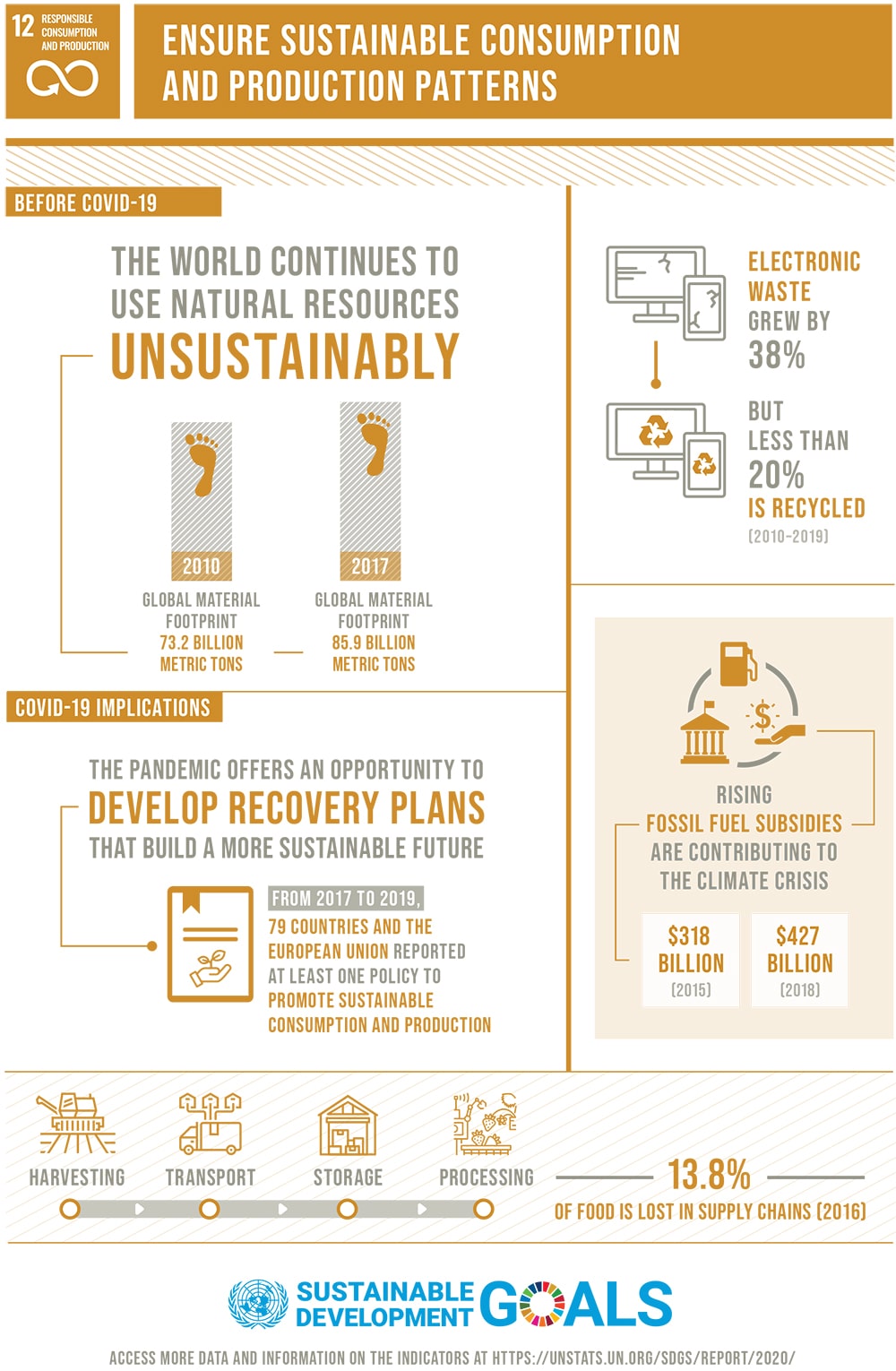Why is responsible consumption and production important
Production and consumption are activities that guide any economic interaction that takes place in a society. They ensure that there is movement of money, goods and services. This movement leads to economic development of a nation. However this development is parallel to proportional, if not greater, environmental degradation. Especially driven by profit motive, over utilization of the raw materials used has led to some irreversible changes to the ecosystem.
Whether it is material footprint, water usage, food waste or plastic usage, these elements exist in the dichotomy of production and consumption, and have heavy implications regarding their social and environmental impacts. According to the Sustainable Development Goals Report-2020, the global material footprint, which is an indicator of the pressure economic growth and fulfillment of material needs put on the environment, increased by 85.9 billion metric tons in a decade.
This is only a glimpse of what inefficient and overly utilised consumption and production patterns result in. This exploitation also gives rise to inequitable systems of distribution, by providing excess in specific regions and while other specific regions have a shortage. An example is the inequitable distribution of food across the globe. While regions rich in access to food generate food waste, there are regions which lack the basic right of food security. This is synonymous to the other industrial and household waste generated which goes unrecycled and untreated, thus losing potential for efficient use and harming the ecology.
The UNDP also shed light on how one of the most important production processes, that is agriculture, uses the most amount of safe water, approximately 70% of globally usable water. When a production process that is as primordial as agriculture is shown to use so much water unsustainably, the exploitation done by industries is unfathomable.
Therefore a need arises to manage resources and waste efficiently and responsibly.

Understanding the root cause for inefficient consumption and production
Production and consumption are activities which both require resources past the fixed assets and manpower. These activities utilise environmental resources, exploitation of which can lead to devastating impacts for the environment. Due to irresponsible patterns of consumption and production, an unnecessary bracket of resources is wasted in the process of economic transactions.
Food loss and untreated waste along with production costs negatively impact the environment. The inefficiency in production and consumption processes also bears irreplaceable costs in the form of loss of quality and quantity.. This loss is incurred during harvesting, storage and transportation of products, which further create a need to cover up losses by excess production. This leads to overuse of natural resources such as water, which deplete faster than their rate of renewal, in addition to causing possible contamination and pollution.
The coronavirus pandemic has posed both a challenge and an opportunity. It has exposed ground realities and effects of unsustainable and inefficient use of resources, along with irresponsible practices and patterns of consumption and production. It has also enabled an opportunity for the recovery plans to be more sustainable consumption and production centric.
The United Nations Environmental Programme (UNEP) has emphasized on sustainable consumption and production, explaining it to be efficient and sustainable use of resources, minimized to cater to the basic products essential while eliminating unnecessary wastage, in order to not jeopardize the future generations.
Changemakers striving for responsible consumption and production
There are various organizations and institutes that aim to educate regarding and initiate towards responsible consumption and production. The Blue Chip foundation is an organization which conducts global scale, multi-stakeholder initiatives and partnerships, focusing on community based action, to ensure progress of the sustainable development goals. The Food and Agriculture Organization (FAO) is another body that researches and publishes reports regarding the status and progress of sustainable production and consumption. There are various organizations for waste management and elimination of food waste. Waste Management, is a company from America which provides waste management and environmental services for other organizations and companies. The National Waste & Recycling Association is a trade association representing private waste recycling companies, service providers and businesses. Paperman is an Indian organization that functions on a web platform and offers on-platform recycling services with the proceeds being directed to local NGOs, for the purpose of revitalizing India’s waste economy. The Real Junk Food Project (TRJFP) is an organisation that takes the food meant to be discarded from food suppliers such as supermarkets and restaurants, and uses it to make meals sold on a basis of pay as you desire.
What youth can do as a TAL transformer
Consumption and production processes are present in every interaction of life, whether social or economic. Therefore the responsibility to set up patterns of consumption and production which are viable, environmentally conscious and waste efficient is a task that requires coordination within the community.
What you as a transformer for the society can do, is use social advocacy, philanthropy and entrepreneurial/business ideas in an innovative manner to provide a progressive direction for reaching the goal. Instances of which are as follows:
Social Advocacy
- Educate regarding informed purchases
- Educate regarding consumer responsibility and waste reduction
- Advocate for proper waste disposal and management
Social Philanthropy
- Invest in water recycling and treatment
- Fund efficient systems of food production and disposal
- Invest in models of sustainable practices
Social Entrepreneurship
- New solutions for sustainable and efficient consumption and production through environmentally conscious management of waste and chemicals
- Building patterns to restructure product life cycles by understanding social impacts
- Finding value chain intervention points of production that can be managed sustainably
References
United Nations (2020). The Sustainable Development Goals Report 2020. New York: United Nations, Department of Economic and Social Affairs. Retrieved from https://unstats.un.org/sdgs/report/2020/
https://www.undp.org/sustainable-development-goals#responsible-consumption-and-production
Sustainability Program Manager
